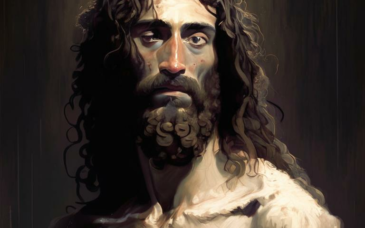February 29, 2000 (David W. Cloud, Fundamental Baptist Information Service, P.O. Box 610368, Port Huron, MI 48061-0368, fbns@wayoflife.org) - Many modern Evangelical theologians exalt the fifth century Augustine, but for our part we reject him as a heretic. Many historians have wisely observed that Augustine (354-430) rejected the New Testament faith to such a degree and wielded such vast influence that he laid the foundation for the formation of the Roman Catholic Church. Benjamin Warfield said that "in a true sense" Augustine is "the founder of Roman Catholicism" (Warfield, Calvin and Augustine, p. 22). The Roman Catholic Church itself acknowledges Augustine as one of its "major Church Doctors," and has canonized him as a saint.
Augustine was a persecutor, and the father of generations of persecutors. "Augustine of Hippo did not shrink from giving a dogmatic basis to what had come to be the practice of the church, and even professed to find warrant for it in Scripture. ‘It is, indeed, better that men should be brought to serve God by instruction than by fear of punishment, or by pain. But because the former means are better, the latter must not therefore be neglected. Many must often be brought back to their Lord, like wicked servants, by the rod of temporal suffering, before they attain the highest grade of religious development. . . . The Lord himself orders that guests be first invited, then compelled, to his great supper.’ And Augustine argues that if the State has not the power to punish religious error, neither should it punish a crime like murder. Rightly did Neander say of Augustine’s teaching, that it ‘contains the germ of the whole system of spiritual despotism, intolerance, and persecution, even to the court of the Inquisition.’ Nor was it long before the final step was taken in the church doctrine of persecution. Leo the Great, the first of the popes, in a strict sense of that term, drew the logical inference from the premises already provided for him by the Fathers of the church, when he declared that death is the appropriate penalty for heresy" (Vedder, Our New Testament, pp. 97,98).
The bitter persecutions poured out upon the Bible-believing Donatists were largely at the instigation of Augustine. The Donatists contended for pure New Testament churches comprised only of those who evidenced repentance and faith. They practiced a congregational form of church government. They baptized those who came to them from churches they considered to be heretical, arguing that baptisms at the hands of men and churches which did not follow the New Testament Faith are invalid. Thus they were labeled "rebaptizers," but their leaders argued that they believed in only one baptism--one true baptism. Donatist Pastor Petilian stated: "He who accuses me of baptizing twice, does not himself truly baptize once. ... The apostle Paul says there is one Lord, one faith, one baptism; this one baptism we openly profess, and it is certain that they who think there are two, are insane" (David Benedict, History of the Donatists, 1875, p. 49). Augustine opposed these people, arguing for a lax church discipline which allowed for unregenerate pagans and immoral ecclesiastical leaders, and demanding that the Donatists submit themselves to a centralized Catholic church system. Because the Donatists refused to submit to these heresies, the Catholic authorities joined hands with the secular powers to persecute them. Many of their church leaders were put to death and great numbers of them were forced into exile. David Benedict, who labored for 10 years on his history of the Donatists, working largely from ancient Latin texts, gave this summary:
"The Novatians and Donatists were called Puritans because they held that the visible church of Jesus Christ does not, and ought not to, consist of any but those who are free from spots and falls, and that all others should be cast out. When the Catholic church was notoriously full of bad members, it was said by Augustine, the Donatist discipline would split it into a thousand schisms. The reforms of North Africa, unlike the reformers of later times, did not leave their work half done. Having repudiated the head of the church which they left, they also disowned its members, its baptisms, its ordinations, and all its official unctions; and all who came to them from the old body, whether bishops, elders, deacons or lay members, were required to be rebaptized, reordained and reappointed in their new connection, in their different stations" (Benedict, History of the Donatists, pp. 186,187).
Though we would not agree with the Donatists on every point of doctrine or practice, we have included this testimony because these ancient Christians have been either ignored or slandered in many church histories.
Augustine, akin to the other "doctors" and "fathers" of the Catholic Church, was polluted with many heresies. Like Jerome, he was baptized in Rome, the very seat of apostasy. He adopted some of the allegorical methods of biblical interpretation which were championed by Origen, and he redefined the church and the kingdom of God as an ecclesiastical-political alliance in this present world. He was the father of a-millennialism. "Augustine was the first who ventured to teach that the Catholic Church, in its empirical form, was the kingdom of Christ, that the millennial kingdom had commenced with the appearing of Christ, and was therefore an accomplished fact" (Encyclopedia Britannica).
Augustine taught that salvation was by grace alone, but he confused the issue by claiming that the sacraments were actual means of grace, therefore perverting the Gospel of the grace of Christ and intermingling works with grace (Berkhof, The History of Christian Doctrines, pp. 206,207). Schaff says that the center of Augustine’s doctrinal system was "the free redeeming grace of God in Christ, OPERATING THROUGH THE ACTUAL, HISTORICAL CHURCH" (Schaff, III, p. 998). This is to confuse grace with church sacramentalism. The true grace of Jesus Christ is not channeled through a church; it is offered directly to the sinner through the Lord Jesus Christ. There is no mediator between Christ and man. Augustine’s error pertaining to grace is one of the chief errors of Romanism.
Augustine also taught that Mary is sinless, blasphemously claiming for her that which belongs exclusively to the immaculate Lord Jesus Christ. He also taught a form of purgatory.
Augustine is one of the fathers of the heresy of infant baptism and he further taught that man is regenerated through baptism. He claimed that unbaptized babies are lost. "Originally, only adults were baptized; but at the end of the second century in Africa, and in the third, generally, infant baptism was introduced; and in the fourth century it was theologically maintained by Augustine" (Armitage, A History of the Baptists, I, pp. 216,17). Of infant baptism Augustine pompously declared, "He that does not believe it, and thinks it cannot be done, is indeed an infidel" (Orchard, Concise History of the Baptists, p. 96). Augustine provided leadership for the Council of Mela, in 416, which made the wicked proclamation "that whosoever denieth that infants newly born of their mothers are to be baptized, let him be accursed" (David Benedict, A General History of the Baptist Denomination, I, p. 59).
Augustine exalted the authority of the "church" over that of the Bible, saying, "I would not believe the gospel, if I were not compelled by the authority of the universal church."
The noted Baptist historian Thomas Armitage observes that Augustine "became the champion of ecclesiasticism, sacerdotalism and sacramentarianism, all distorted into monstrous proportions" (Armitage, I, p. 217).
[This report on Augustine is excerpted from the book Rome and the Bible: Tracing the History of the Roman Catholic Church and of Its Persecution of the Bible and of Bible Believers, copyright 1996 by David W. Cloud.]

